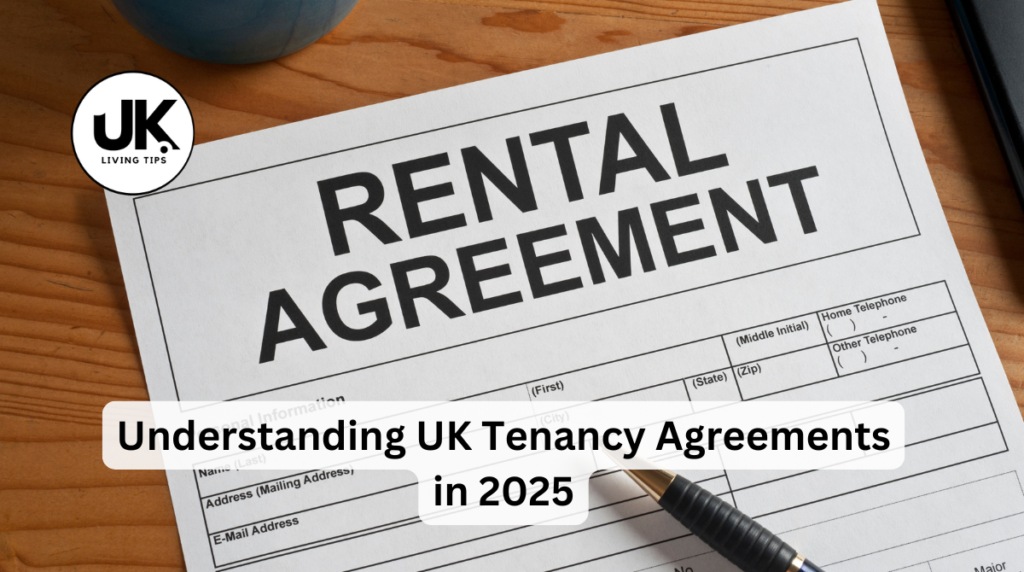Welcome to UK Living Tips, in this Article we going to talk about UK rental market can be daunting, especially for newcomers. A crucial element of this process is understanding your UK tenancy agreement – the legally binding contract between you and your landlord. This guide provides a clear and concise overview of key aspects of UK tenancy agreements in 2025, considering potential legislative changes and current best practices.
Overview
Types of UK Tenancy Agreements:
The two main types of tenancy agreements in the UK are:
- Assured Shorthold Tenancy (AST): This is the most common type of tenancy agreement for private renters. It typically lasts for a fixed term (usually 6 or 12 months), after which it rolls over into a periodic tenancy (month-to-month). The landlord generally needs a valid reason to evict a tenant during a fixed term.
- Periodic Tenancy: This arises after a fixed-term AST expires or if a tenancy agreement doesn’t specify a fixed term from the outset. It continues on a month-to-month basis, with either party able to provide the required notice period to end the tenancy.
Key Clauses to Understand:
Your tenancy agreement should clearly outline several crucial details:
- The Property Address: This should be correct and accurate.
- The Rent Amount and Payment Method: This should specify the exact rent, when it’s due, and the preferred payment method.
- The Term of the Tenancy: This specifies the duration of the fixed-term tenancy (if applicable) and the notice period for ending the tenancy.
- Deposit Protection: Your deposit must be protected in a government-approved scheme (Tenancy Deposit Scheme). The agreement should state which scheme is used and provide details on how to access your deposit at the end of the tenancy.
- Inventory: A detailed inventory of the property’s condition should be included. This protects both tenant and landlord from disputes regarding damage or existing issues. Ideally, you should check the inventory carefully and sign it accordingly upon move-in.
- Repairs and Maintenance: The agreement should outline the landlord’s responsibilities for repairs and maintenance, and the tenant’s responsibilities for reporting necessary repairs.
- Utilities: It’s essential to clarify which utilities (gas, electricity, water, council tax) are included in the rent and which ones the tenant is responsible for.
- Right to Rent: Landlords are legally obliged to verify your right to rent in the UK. This process typically involves providing necessary identification documents.
- Break Clause: Some tenancy agreements include a break clause, allowing either party to terminate the tenancy before the end of the fixed term, usually under specific conditions. These conditions should be clearly outlined.

What You Need to Provide:
Your landlord will need to see original documents proving your right to rent in the UK. These might include (but are not limited to):
- Passport: A valid passport showing your nationality and any relevant visa information. This is generally the most straightforward document.
- National Identity Card (If applicable): A UK or other EU national identity card.
- Biometric Residence Permit (BRP): If you are not a British citizen, you might have a BRP. This is a physical card containing your immigration information.
- Other acceptable documents: There are several other acceptable documents, depending on your individual circumstances. The government website has a comprehensive list.
Where to Find the Official Information:
The most reliable place to get information about the Right to Rent scheme is the official UK government website. Searching for “Right to Rent” will lead you to the correct information. This will have the most up-to-date details on acceptable documents and the process.
In short: You don’t need to actively search for a “Right to Rent code.” Your landlord will verify your right to rent using official government systems and the documents you provide. Focus on gathering your original identification documents; that’s your primary action.
Changes in Legislation (potential in 2025):
While the specific legislative landscape changes constantly, potential shifts to consider include:
- Rent Controls: There might be further developments concerning rent control measures in certain areas, aiming to prevent excessive rent increases.
- Strengthened Tenant Rights: The government may introduce further legislation to enhance tenant protections and streamline dispute resolution processes.
- Digitalization of Tenancy Agreements: Increased use of digital tenancy agreements might become more common, requiring tenants to familiarize themselves with electronic signing and management systems.
Frequently Asked Questions (FAQ):
Q: What if my tenancy agreement doesn’t cover something?
A: If a matter isn’t explicitly covered in your agreement, it’s governed by the relevant legislation, such as the Landlord and Tenant Act 1985 and other relevant statutes. It’s best to consult a housing advisor or solicitor if you are uncertain about your rights and responsibilities.
Q: My landlord is requesting excessive fees. What can I do?
A: Excessive or unfair fees are illegal. Check your tenancy agreement and relevant legislation. Report any unreasonable demands to your local council or a housing charity.
Q: How do I report repairs?
A: Follow the procedure outlined in your tenancy agreement. This often involves notifying your landlord or letting agent in writing, outlining the issue, and potentially including photographic evidence.
Q: Can my landlord enter my property without notice?
A: Generally, your landlord needs to give you reasonable notice (usually 24 hours) before entering your property, unless there’s an emergency. Your tenancy agreement should stipulate the terms for entry.
Q: What happens if my landlord doesn’t fulfill their obligations?
A: You can contact your local council’s housing department or a housing charity for advice and assistance. In some cases, you might be able to pursue legal action.
Q: How do I get my deposit back?
A: Your landlord is obliged to return your deposit within a specified timeframe after the tenancy ends, provided the property is left in the agreed condition (as per the inventory). If there’s a dispute, utilize the government-approved tenancy deposit scheme to resolve it.
Q: Where can I get further advice?
A: Several organizations provide free and impartial advice on tenant rights, including Shelter England, Citizens Advice, and the National Residential Landlords Association (NRLA). You might also consider consulting a solicitor specializing in housing law.
Conclusion:
Understanding your tenancy agreement is crucial for a positive rental experience. Familiarize yourself with the key clauses and your rights and responsibilities. If unsure about anything, seek professional legal or housing advice promptly. By being well-informed, you can protect yourself and ensure a smooth and trouble-free tenancy.



